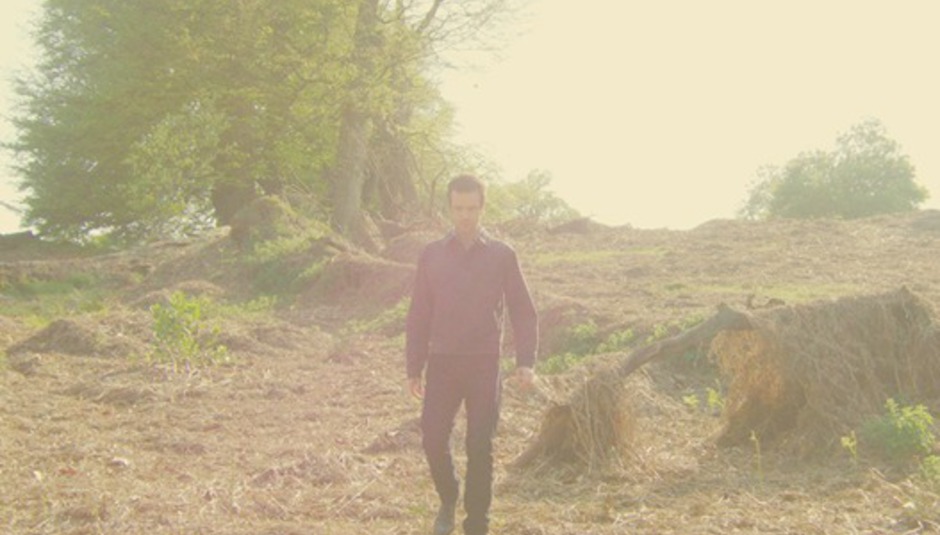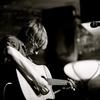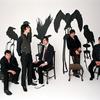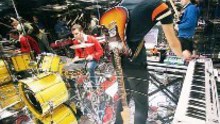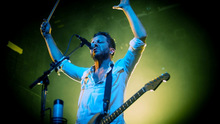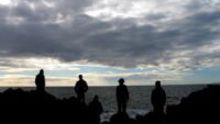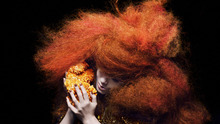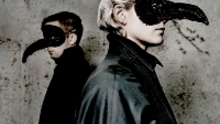Visual and musical art have come to exist as powerful forces in their own rights. They both evoke different senses of visceral pleasures and when combined, the resulting force flourishes into a canvas of evocative stimulation. Alongside Battles, former Appliance frontman James Brooks manipulates these two artistic outlets into one arousing force. James’ Roman Roads is proof of how effective it can be. Everything within the record slowly builds up into a blossoming of intricate and panoramic ideas, only enhanced by the concept of Roman roads being used as a catalyst to launch such ideas. DiS chats to James on how this has shaped his music.
DiS: So Roman Roads is a very literal title. How have they inspired you?
James Brooks: I live in East London around the Bethnal Green and Hackney area. There’s a road there called Roman Road and it’s always intrigued me when I pass it. I wonder about its history and whether it was actually a Roman road. It’s from that humble beginning that I started to think about it from a musical perspective the interesting linear subject associated with the straight picture of the Roman road. I wanted my music to have a relationship with the visual. My ambition with Roman Roads was to write a number of tracks in relation to other roads across Europe. I just find the relationship with an autobahn interesting. Obviously the Roman roads came before the autobahns or motorways but they have quite a strong relationship together.
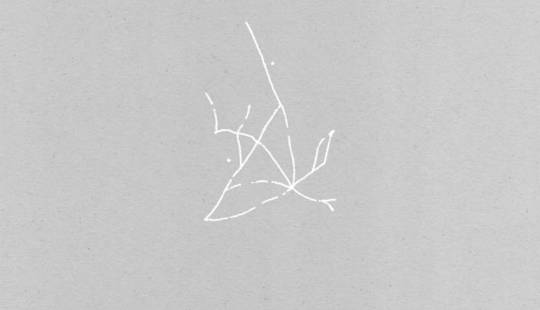
DiS: Listening to the three track sampler, Viae sounds to me like a sort of casual stroll, Octavian, a realisation of something and then Fosse Way as the revelling in such a realisation. Am I right in thinking that each song represents a different journey on different roads?
James Brooks: Of sorts, I suppose. You have to be careful not to make it too descriptive and I wanted to make it slightly looser than that. The title developed from an interest in the way how Roman emperors had a normal name and were given a new identity. It’s really interesting how through the titling, it can reference the musical change of gear or another section in the same way that it combines two sections together in a trap. I’m interested in hypnotic drones and bringing two pieces together is slightly awkward.
DiS: You could say that the repetition and minimalism allows people to observe the music and its landscapes in a more focused way...?
James Brooks: I’m interested in the mantra that you can build something up into a frenzy. It’s like this tornado that becomes more intense and saturated. For me that’s interesting because the idea of traditional songs is something I have done in the past. It doesn’t interest me at all now and I’m now more focused in creating a musical space. It’s quite a cliché but once you get the music, you understand these soundscapes, which is an awful term, but there isn’t a better word I can think of. With that I hope I can get the listener to become engulfed in this particular recorded moment, yet still trying to entertain them with traditional song structure. Hopefully they’ll have intensity with their listening. Steve Reich in the modern classical terms is someone I find interesting for this. Glenn Branca also creates fascinating guitar compositions. I wanted to strip back and have the guitar do everything on its own as if ten guitars were playing at the same time.
DiS: Would you say this music has swept away your associations with Appliance?
James Brooks: I’d be silly to not recognise that Appliance is part of my history and that’s fine. I’m very comfortable with it, yet this is a different project. There are elements of Appliance in this project because when I played guitar with them there was that repetition and these little phrases that drowned around in a live context. What we did as a band all feels natural and comfortable but we’re not a band anymore and this is me doing everything in a solo context. During my relationship with Appliance we used to have this saying that we’d never have a bridge. It was just an awkward section that took you nowhere.
DiS: Do you feel there’s much more pressure to perform on your own now?
James Brooks: I suppose those moments when you play something like a festival you can bounce off each other and get everyone’s minds in the right place, whereas I haven’t got that comfort now. I can do that with a machine though and I now have a relationship with the equipment on stage. It is a different thing where you have this camaraderie as a band and do everything together as a force. It’s you against whoever. Perhaps one person’s feeling lethargic but you can all whip yourself up and play a great show. There’s more responsibility on me now but that’s ok because when you’re all together, you still have to come up with the goods and do a great show for people who have paid money and decided to spend that night seeing you. It’s an honour that shouldn’t be taken for granted.
DiS: You handcrafted each of the releases and you’re quite the visual artist but Roman Roads evokes a lot of mental imagery. Do you see art as more of a physical or mental concept?
James Brooks: I guess with the kind of work I make as a visual artist, there is common ground in the way I’m interested in drawing and type faced media. There is a relationship between music and visual art. I use audio sometimes as an artist and the idea of repetition and loops keeps coming back in whatever I do. It’s engrained in my psyche. They kind of bounce off each other which is why I’m excited bringing those two worlds together for the first time. I’ve always kept them separate but I’ve realised that they can talk to each other. When I played at the Roundhouse I used projections and, for me, that’s really interesting to have. I like that relationship between moving image and musical performance and that’s something I’ll certainly do again. You’ve got the music world and the art world and they do ask different things of their audience. It’s a different thing and you’ve got to reach out in different ways. Both are exciting as each other and they’re all interesting cultural forms.
DiS: Do you find it more difficult to create visual or musical art?
James Brooks: I went through the art school system so my qualifications were in the artistic domain. With music, it’s always come as an intuitive thing. I like bands like Joy Division. They were a band who weren’t musical trained but they used their instruments in a creative way and became directing and controlling in reference to the records they enjoyed. I think a lot of interesting independent music has been made that way, feeding off something they like and then learning a few chords or being fairly proficient on an instrument but putting their ideas out there. There is a slight issue with musicianship when you become too good and slip into habits that aren’t always positive. It’s really important to keep yourself a little raw and let that instrument fight back. Anyone who’s a virtuoso can sometimes be burdened. I want to use the instrument as a creative tool and not be too engrossed in the trappings. I can’t believe I’m quoting John Lennon but he once said: “Give me an instrument and I’ll write you something on it.” I like that essence of keeping freshness and creative energy. With Land Observations, I enjoyed the sound processing i.e. feeding the guitar goes through the effects. I want surprises where it isn’t about just pure notes.
DiS: Would you say you’ve set yourself barriers musically?
James Brooks: I’ve been playing guitar now for 22/23 years. I’ve picked it up that many times it’s so familiar. I find alternative tunings so interesting now because it throws up ideas in your mind that weren’t there before. It’s interesting to experiment and feed off that. Working in that environment is fantastic and you find moments where you come up with ideas and you try to harness and make sense of it.
DiS: It’s been quite a long gap between your solo stuff and Appliance...
James Brooks: For me, I’ve been spending that time recording things. My computer is clogged up with musical ideas. Things that have taken me in various directions and eventually in the direction I wanted to be and opened what I wanted from the guitar. It’s only now where I feel that I’m ready with the right idea. I didn’t want to do something song based but more something about my first and key instrument which is the guitar.
DiS: The EP focuses on the idea of repetition. Did you feel a repetitive strain when recording Roman Roads?
James Brooks: I’m lucky that I’ve got all my stuff at home. I can add to it each day and there wasn’t ever this frustration. It all came into place elegantly and sometimes things can be forced but this found its voice quickly which is why I’m so excited about it. It felt so right with endless possibilities and okay, they’re only in sketch form, but they’re good ideas that arrived quickly, which is fantastic. In relation to visual artists, I like time based media, and working with video and photography is all about the time. As soon as you speak about those ideas, you’re in the domain of audio and music. We all have limitations and that’s all I know really.
DiS: Do you feel that the delicate intricacies in your music form part of the vital core?
James Brooks: Things grow with people and you don’t want to punch them in the face on the first listen. We’ve all done it where an album has just grown and it has this enigma. I think that’s the wonderful magic of why you keep going back to something and why it keeps intriguing you. The work I make visually fundamentally includes drawing as one of the most important things I do. You put down one mark with a pencil and you can add and change stuff. There is a sense of subtle details where it’s not a big bold statement and I like the quieter things.
DiS: Why such interest in the particular road ‘Fosse Way’?
James Brookes: There are other tracks that have titles of other roads. I was keen on ‘Fosse Way’ not being a single but everything needed to be equal whilst keeping their own identity and importance. ‘Fosse Way’ is a fragment of the longer album track and it’s a fragment of a larger hole.
DiS: What future concepts do you think you’ll focus on?
James Brooks: The concept of Roman roads is one that’ll run and run and it’s a broad concept that’ll tackle other concepts that I’ll observe. Roads were and are important because I like the way they have musical reference to momentum and 4/4 time and there’s something physical in the way that techno is physical. It’s got references to the German musical style Neue and the motorik. They’re all pillars for me and backbones of what I’m interested in. There are things that form you musically and they will always be there despite listening to newer things but you always go round the circle back to the key records. One of the first records that changed me as a teenager was Ride’s Nowhere. There were a lot of dense layers but they were melodious at the same time. They were a garage band of sorts that were making a bigger sound. This project is delicate and I’m not really using overdrive or distortion. All those shoe gaze bands are fascinating and bands such as Durutti Column were important to the project.
Roman Roads is out on 4th July via Cargo.

